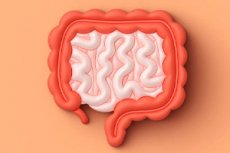New publications
Scientists have discovered an important new cause of inflammatory bowel disease
Last reviewed: 02.07.2025

All iLive content is medically reviewed or fact checked to ensure as much factual accuracy as possible.
We have strict sourcing guidelines and only link to reputable media sites, academic research institutions and, whenever possible, medically peer reviewed studies. Note that the numbers in parentheses ([1], [2], etc.) are clickable links to these studies.
If you feel that any of our content is inaccurate, out-of-date, or otherwise questionable, please select it and press Ctrl + Enter.

Scientists from the Francis Crick Institute in London have identified a genetic mechanism underlying the development of inflammatory bowel disease (IBD) and other autoimmune or inflammatory conditions, and identified existing drugs that can target this pathway.
Previous genome-wide association studies of IBD and several other inflammatory and autoimmune diseases had identified variants in a specific region of the genome associated with these conditions. Their role in these diseases was unclear because this part of the genome was a “gene desert,” containing noncoding stretches of DNA. There, they found a stretch of DNA that increased the amount of proteins made by nearby genes; this enhancer was only translated in macrophages, immune cells with an important function in IBD.
Essentially, it increased the activity of a gene called ETS2, a gene quite far from that stretch of DNA that the scientists had found was necessary for nearly all of the macrophages’ inflammatory functions, including several that directly contribute to tissue damage in IBD. Increased ETS2 activity in macrophages made them look like inflammatory cells in IBD patients.
The results were published in the journal Nature.
There are no drugs that directly block ETS2, but the researchers found that MEK inhibitors — drugs that can be used to treat cancer — targeted other parts of the pathway and reduced inflammation in macrophages and intestinal samples from IBD patients.
This discovery may help identify drugs and targets for the treatment of IBD, which has historically been difficult.
How does IBD function in the immune system? Inflammatory bowel disease (IBD), which includes ulcerative colitis and Crohn's disease, causes inflammation in the digestive tract, leading to a variety of symptoms, including pain, diarrhea, and, less commonly, constipation, weight loss, and problems absorbing nutrients. An estimated 6 million people worldwide have IBD, and about 3 million people in the United States have the condition, according to the Centers for Disease Control and Prevention (CDC). The underlying cause has not been determined, but recent research suggests a link between genetics, diet, and gut microbiota that may lead to the development of IBD.
Only about 10% of drugs for these inflammatory or autoimmune diseases that enter clinical development are fully approved for treatment, which the researchers behind the paper say reflects a lack of understanding of how these diseases work. This prompted their research to look at how genetic pathways might contribute to the development of these diseases.
Ruslan Medzhitov, PhD, professor of immunobiology at the Yale School of Medicine, told Medical News Today that the researchers' findings represent a very important step forward in identifying and targeting genetic variants that can cause IBD and other medical problems.
"Studies that look for genetic associations with a particular disease often find signals (genomic variants) that do not correspond to any specific genes. This makes it very difficult to figure out how these variants affect the development of the disease. In this case, such a genetic variant was associated with an area of the genome where a long stretch of DNA is devoid of genes (the so-called "gene desert")," Medzhitov said.
“In this study, the scientists were able to discover that this genetic variant, known to be associated with an increased risk of inflammatory bowel disease (IBD), affected a region of DNA that controlled the expression of a gene (called ETS2) located far from the variant. This is the first important discovery - linking an “anonymous” mutation to a specific gene. Second, they showed that increased expression of ETS2 in macrophages promotes their inflammatory functions, which explains how it contributes to the development of IBD.” - Ruslan Medzhitov, PhD
Şebnem Ünlüisler, a genetic engineer at the London Institute of Regeneration, told Medical News Today that while the study is a step forward in understanding how inflammatory or autoimmune diseases work, larger trials of the findings are needed.
"The study highlights a significant role for the ETS2 gene in mediating inflammation in macrophages, particularly in the context of inflammatory bowel disease (IBD). By identifying a specific enhancer in the gene desert that regulates ETS2, the study provides a deeper understanding of how genetic variations may contribute to chronic inflammatory conditions," said Junluishler.
"One potential drawback is that the study's experiments were mostly conducted in controlled laboratory conditions, which may not fully replicate the complex environment of a living organism. More diverse and larger samples could help confirm the findings," she added.
Could IBD be reduced with existing drugs? “IBD is a complex disease in which many genes contribute in different ways. This particular pathway may be relevant for a subset of IBD patients,” Medzhitov said. “But the broader implication is that the approaches used here may be applicable to other cases where genetic variants have an unknown mechanistic relationship to the disease (and not just IBD).”
Junluishler said that with broader application of the researchers' findings, the ability to combat autoimmune diseases could increase significantly. However, she cautioned that the delicate nature of such diseases and their pathways in the body could make treatment more challenging.
"If these findings prove broadly applicable, they could lead to new therapies that target ETS2, potentially reducing inflammation more effectively and with fewer side effects than current treatments. However, targeting ETS2 can be challenging and requires careful design to avoid unintended effects on other functions in the body," she said.
